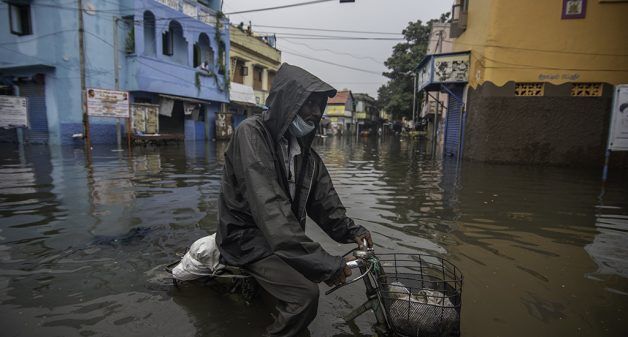
Incessant rains bring flood of emotions
As India’s monsoons increase in intensity, anxiety and fear – of even a small shower – are becoming common. While everyone responds differently, professionals offer tips to cope.

As India’s monsoons increase in intensity, anxiety and fear – of even a small shower – are becoming common. While everyone responds differently, professionals offer tips to cope.
Noticing rainwater entering her neighbour’s small porch, Karpagam B., decided to call her at 6:30 am, knowing her neighbour would not wake up till much later.
It had been raining in Chennai since the night before and she was on high-alert. She did not want her neighbour to be left with unsalvageable books and computers, as she had been during the 2015 floods.
Despite relentless rains that year, in the last week of December, thousands of residents had been caught by surprise when water from the Chembarambakkam reservoir flooded the city. Chennai became marooned, screeching to a standstill without electricity for three days; and five days in some localities.
Now, even a small shower evokes fear among many residents.
As many parts of the country experience rains of increased intensity, fear and paranoia are becoming common, irrespective of societal and educational background.
A mere drizzle triggers panic in some
Vimala Shankar gets jittery even when it drizzles, ever since her independent house in the heart of Chennai was flooded in 2015.
“It was only material loss, replacing furniture and woodwork, and discarding some clothes. But because of that flood, I’m now scared whenever it rains,” she said.
During the December 2020 monsoon, when water was released from the Chembarambakkam reservoir, she did not sleep a wink at night, paranoid of another flooding. The same situation is playing out now as there is no let-up in Chennai’s deluge.

In Tamil Nadu the northeast monsoon from 1 October to 15 November this year had a 54% deviation from normal rainfall, according to the Regional Meteorological Centre (IMD). However, it is not the intensity of rain but the memory of floods that scare many people now, regardless of whether they were affected or not.
Karpagam lives in an apartment that escaped the 2015 floods. But she fears the worst.
“Except power failure for three days and depending on neighbours for drinking water, I didn’t face any problem. Yet I’ve become scared of the rains,” she said.
Is such fear irrational?
“Generally, people are more prone to develop anxieties about dangers, such as floods, snakes and quakes, that are derived from nature,” said Daniel J., a Chennai-based psychiatrist.
He attributes it to a phenomenon of natural evolution. For instance, a vehicle might also pose danger, but we don’t fear it the same way. Although he added that people differed in their response to such dangers.
Harini Sriram, a psychologist and occupational therapist, agrees that normally it is only those who have had a similar traumatic experience, like the 2015 floods or 2016 cyclone, develop deeper fears.

While others who were not adversely affected by the event, but prone to anxieties in general, can become nervous about “even for a small deviation from their normal routine,” Sriram explained.
Shankar started clearing things from her lower shelves right after the onset of monsoon even though her family felt that her fears were unfounded this monsoon season.
“Emotional responses and behaviours are in a spectrum, ranging from being totally indifferent to downright panicky,” said Daniel. “Their fears may or may not be warranted. How we react depends on an individual and past experience.”
Warranted or not, how does one get through the event, knowing that severe rains or floods are expected, and are becoming common?
Staying calm amidst chaos
For those who become easily anxious, Sriram suggested regular breathing exercises. But seeking therapy might be another option.
“If people have not healed from a similar past traumatic experience, they could seek counselling,” she said.
Distraction is also a powerful tool.

“Instead of dwelling on the situation, you can divert your mind by praying, reading story books, stitching or listening to music,” she said.
Avoid the media storm
Daniel suggested reasoning and re-evaluating to see if the risk they fear is real. But both the professionals suggested that avoiding media – whether it is TV, newspapers or social media – could go a long way in helping people whose anxiety levels increase easily.
The government can also play a role in helping people stay calm.
“The administration can reassure citizens of the back-up plans and share emergency contact details,” said Daniel.
Nagesh. P and his family were caught in the 2015 floods when a table and cot were their only dry perches as water flooded their home. He thinks the government could do more when such emergencies arise – like send voice and text messages on the phone when there is no power.
“I know rains and floods are beyond my control. I just decide what I should do in case of flooding and try not to worry,” said his wife Manjula.
Embrace the power of preparation
Preparation can be another empowering tool.
Clearing shelves and moving things out of harm’s way can make one feel prepared and give back a sense of control. Another option, for some, is to shift away from areas that are more prone to flooding at the onset of a storm.
“If you’re in a low-lying area, and if flooding is likely, you can shift in advance as a precaution,” said Sriram.
Postscript
While the rainwater in the street played peekaboo with Karpagam’s neighbour for days, it finally entered her house.
Naturally, the electricity went off.
While it was easy to get through the day, an eerie calm descended over the neighbourhood at night. But humanity kicked in, with many neighbours playing word games and even singing in the dark, proving that community and neighbourliness can be another powerful tool against fear and paranoia.
Jency Samuel is a civil engineer and an independent journalist based at Chennai.